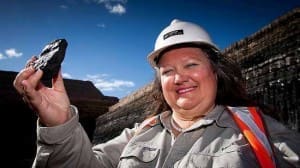MINING magnate Gina Rinehart’s Hancock Prospecting is the new owner of the coveted Inverway and Riveren Stations in the Victoria River District of the Northern Territory.

Gina Rinehart
The acquisitions add substantially to Hancock’s already growing northern Australian grazing property portfolio which currently includes Fossil Downs, Liveringa and Nerrima in WA’s Kimberley region, and a series of smaller properties in southern Queensland and NSW used for Wagyu production.
The Inverway-Riveren aggregation, covering about 550,000ha of land in the southern VRD district west of Katherine, supports a combined herd of about 40,000 head of cattle. The acquisitions take Mrs Rinehart’s total cattle operations to an estimated 95,000 head.
The vendor was diversified Indonesian agribusiness, JAPFA Santori, which bought the properties at the depths of the post-2011 live export crisis. Both properties had been owned for years prior to that by members of the Underwood family. An unsuccessful attempt was made to auction the properties in July 2012, with Riveren passed in for $19 million and Inverway, $15 million. JAPFA made its private offer soon afterwards.
Significantly, at a time when there has been considerable debate about the encroachment of foreign investment in Australia, the transaction represents another example of Australians ‘buying back the farm’ from offshore owners. See this earlier Beef Central property report.
“This is another quality investment for HPPL, with significant opportunity to expand further,” a Hancock statement issued a few minutes ago said.
“HPPL was able to move quickly and decisively to acquire these high quality cattle stations after a previously announced transaction with other parties did not proceed,” it said.
Earlier this year the vendor told media it had signed a contract to sell Riveren Inverway to Archipelago Beef Pty Ltd, owned by Luke Butler. The reported deal drew media attention to Mr Butler’s business history, including a former bankruptcy and a three-year ban on managing corporations imposed by the Australian Securities and Investment Commission in 2005. Mr Butler also announced at the time that he had signed a contract to purchase Ban Ban Station in the Northern Territory.
As rumours began to circulate of deposit schedules not being met during the settlement period, the holdings were re-offered on a low-key ‘off market’ basis by Colliers International’s Rawdon Briggs.
“Hancock Prospecting and Japfa Santori Australia Pty Ltd were able to reach agreement on an expedited process reaching a successful deal without impacting the operations,” this morning’s statement said.
Chairwoman of Hancock Prospecting, Gina Rinehart, said she was “excited about the acquisition of these two cattle properties and to be investing in Australia, particularly in the Northern Territory, a jurisdiction which is supportive of agriculture and other investments.”
“This acquisition builds on Hancock Prospecting’s proud history in Australian agriculture. I am passionate about our agricultural industry and developing Northern Australia,” she said.
Garry Korte, CEO of Hancock Prosecting said HPPL continued to make significant investments to grow its beef operations and to build a “dynamic diversified agricultural profile in Australia.”
“We plan to invest further to grow our herd numbers on Hancock cattle stations and are just beginning to develop the 2GR beef brand to capture additional value through distribution networks in markets that value our clean green Australian food products,” he said.

BIG THANK- YOU GINA
This looks like a good development. It keeps rural land in Australian hands. It avoids the political interference in land ownership like we saw recently in the Chinese bid for Kidman.
Having said that I suspect there is probably a need for large injections of capital to realize the full potential of these investments.
We don’t know what Mrs Hancocks ultimate plans are for her investments in the grazing industry but I would like to to think that they include building much needed infrastructure, feed lots etc etc. And even a state-of-the-art export abattoir.
Australian capital, either private equity or public equity, seems reluctant to invest funds in Australia’s top-end for the long haul. To a large extent we have always relied on foreign capital to develop our agricultural enterprises. In the beginning it was English money. More recently it has been USA and Japan.
With the growing demand from Asia for animal protein I can see no good reason why we should not welcome foreign capital to develop our cattle industry – including killing and processing facilities where needed, As long as management and ownership control is kept in Australian hands. This could be achieved by insisting on majority Australian ownership, joint ventures, leasehold or some other combination .
Apart from cattle and the production of beef there is enormous potential in northern Australia for the production of a range of food and fiber products for export. It will require very large injections of capital to be successful and will take perseverance and time. Unfortunately investment funds in Australia, either private or public, seems impatient for a quick return.
Properties were sold to Japfa in Sep/Oct 2013.